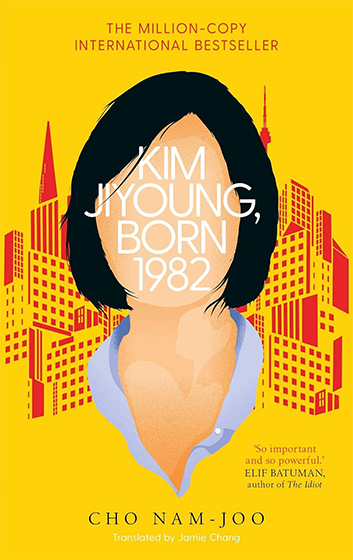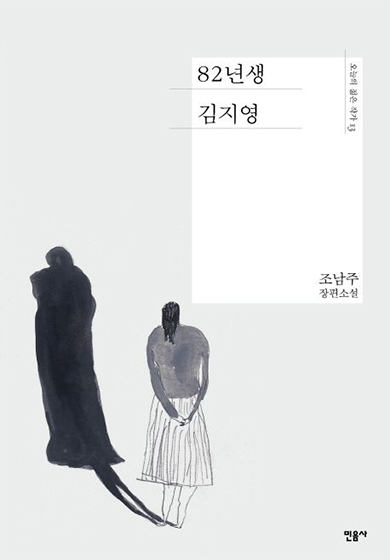|
I Read
Kim Jiyoung, Born 1982 by Cho Nam-Joo
2024.01.02
This article is a review written by an Indian reader of
My passion for reading began at an early age, and books have always been my constant companions. Over the years, I have explored different genres, from comics to romance to thrillers, and each one has stirred different emotions and insights in me. However, the book that has left the most profound impact on me is Kim Jiyoung, Born 1982 (Minumsa) by Cho Nam-Joo. This book resonated with me on a personal level, as if I were reading my own diary. As a novice Korean learner, I read the English translation by Jamie Chang, published by Scribner. I was impressed by how well Jamie Chang conveyed the nuances and intentions of the original author. Kim Jiyoung, Born 1982 is a universal story of women’s lives and struggles, as symbolized by the faceless woman on the cover page.
English and Korean covers of Kim Jiyoung, Born 1982
The novel opens with a contemporary scene, where Kim Jiyoung’s husband is concerned about his wife’s unusual behavior. He initially thinks she is joking or drunk, but he soon discovers that there is a deeper psychological issue at play. The novel then traces Kim Jiyoung’s life story through four phases: childhood, adolescence, early adulthood, and marriage. The reader sees the world from Kim Jiyoung’s perspective as she grows up and tries to navigate the expectations and realities of being a woman in Korean society. Kim Jiyoung, the second daughter of three siblings, and her older sister are taught to sacrifice for their younger brother from an early age. Their mother, Oh Mi-sook, does not explicitly enforce patriarchal norms on them; rather, she tries to educate them about the world and support their aspirations. However, Kim Jiyoung is constantly confronted with a list of rules and restrictions that limit her choices and opportunities as a girl, and she relies on her mother and sister to guide her and shape her identity. Throughout her development, Kim Jiyoung faces various challenges and dilemmas that have no clear solutions, because they are rooted in the gender inequality that pervades her society. Kim Jiyoung questions her existence and purpose, but she never finds satisfactory answers.
Written by Seema Thomas (Reader of K-Book Trends) Seema Thomas (Reader of K-Book Trends) #Kim Jiyoung, Born 1982#Cho Nam-Joo#Reader#India |
Pre Megazine
-

Antique Porcelains, More Beautiful Than Pictures
VOL.70
2024.05 -

My Favorite Book, Whale by Cheon Myeong-Kwan
VOL.70
2024.05 -

New Tarot Made With Korean Colors and Patterns!
VOL.69
2024.04 -

Please Look After Mom by Shin Kyung-sook
VOL.69
2024.04 -

Paper Play – A Great Way for Emotional Development, Concentration, and Creativity!
VOL.68
2024.03 -

Submit Us Your Reviews of Korean Books!
VOL.68
2024.03 -

A Miraculous Workout Routine for a Healthier Body!
VOL.67
2024.02 -

The Hottest Place in Korea, Right Here, Right Now!
VOL.66
2024.01 -

Kim Jiyoung, Born 1982 by Cho Nam-Joo
VOL.66
2024.01 -

Concerning My Daughter by Kim Hye-jin
VOL.65
2023.12 -

Bake Delicious Bread that’s Just Right for Your Taste
VOL.65
2023.12 -

Craft Your Own Special Miniature Furniture
VOL.64
2023.11 -

Take Beautiful Palace Tours With a Book
VOL.63
2023.10 -

A Guide to Beautiful Korean Handwriting
VOL.62
2023.09 -

An Offbeat Trip to Jeju Island
VOL.61
2023.08 -

Prepare for Disasters with a Single Book
VOL.60
2023.07 -

The Hen Who Dreamed She Could Fly by Hwang Sun-mi
VOL.60
2023.07 -

Feel the Street Vibes with Watercolor Painting
VOL.59
2023.06 -

Bone Soup by Kim Young-tak
VOL.59
2023.06 -

Eat Healthier and Tastier – Korean Vegan Food
VOL.58
2023.05 -

Almond by Won-pyung Sohn
VOL.58
2023.05 -

Learn About and Have Greater Fun Drinking Korean Alcohol!
VOL.57
2023.04 -

Knitting YouTuber Daeri Kim’s “Easy Modern Daily Knit”
VOL.56
2023.03 -

A New Section for Readers’ Reviews!
VOL.55
2023.02









